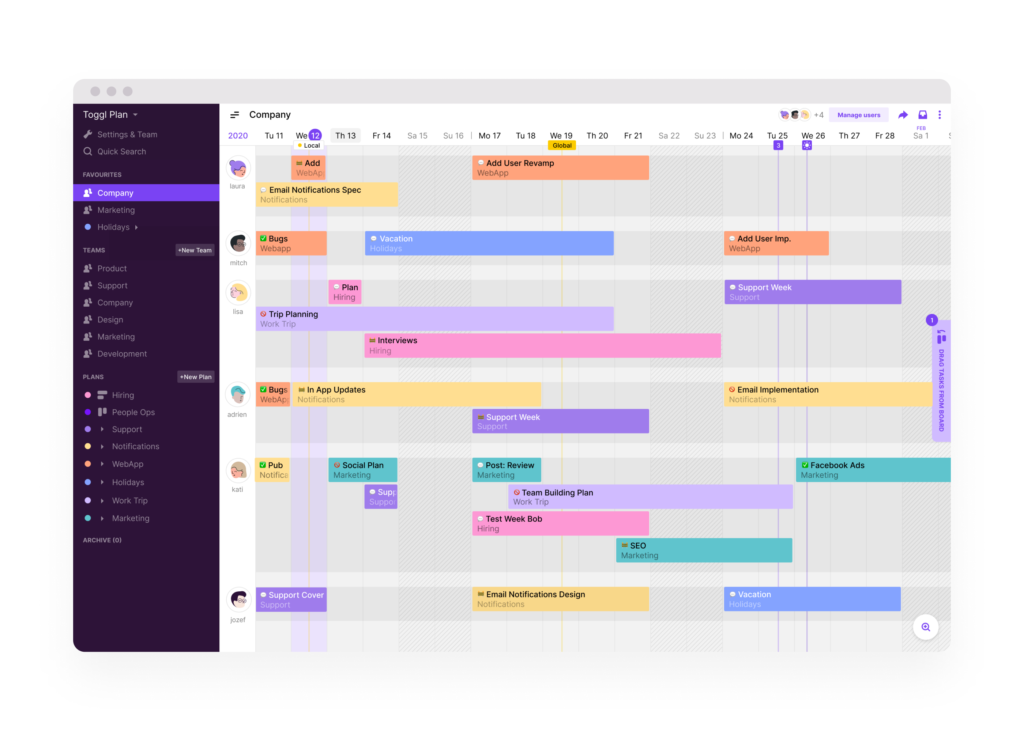Even if we all have different tasks on our to-do list, we all have a similar purpose: to get as much done as possible. To this end, time and task management are two of the most popular strategies for getting organized and for getting work done.
Still, with days limited to 24 hours, the big question is: which one is the best?
What’s time management?

Time management is the process of planning and organizing how much time you spend on specific tasks, projects or goals. It involves taking conscious control over how long you spend engaged in any given activity in order to become more effective and more productive. By tracking and tacking stock of how time is spent, you can decrease the amount of time spent on unproductive activities.
Time management works by identifying priorities and creating a time schedule around them. It’s a great option for those who constantly have to deal with deadlines. Time management is also one of the basic skills for project managers as it allows them to estimate delivery dates.
Initially, time management was applied only to business and work activities. In time, it expanded its scope to include personal activities.
Time management is accomplished via a range of skills, tools and techniques. Everyone needs to create their own system according to their own specific and using the tools that suit them best.
In general, time management has long been considered one of the best strategies for getting things done. However…
The problem with time management
Time management works on the assumption that, if you learn to spend your time correctly, you will get more done. However, no matter how well you prioritize your time, you cannot work all day long. As Thomas Crabb puts it in this article, there will always be more work waiting. The more projects you start, the more tasks you’ll have to complete the following day. The more emails you reply to and send, the more you have to answer back.
Also, with time management, you try to cram as much as possible within a day. This can result to over scheduling and divided attention. When you pay attention to too many things over a short period of time, you won’t be able to pay attention to anything efficiently. Also, overloading can lead to stress, lower productivity, and even burnout.
What’s more, time management can generate stress. If you’re constantly working against the clock, you’re bound to feel stress and pressure at some point. In turn, this can lead to a decrease in effectiveness.
Introducing task management
A task is simply as “a piece of work that needs to be undertaken”. Task management is the process of managing a task through different stages: planning, development, and completion. It works both on an individual and on a group level by getting people to accomplish their goals.
Effective task management involves all the steps from planning to setting a priority, including status, outlining the necessary resources for completion, notifications, and observation. Additionally, task management is another fundamental skill for project managers in 2018.
There are a lot of tools that can be used for task management: online calendars, workflow software and even project management software. All these help you outline different projects, tasks and clear statuses from all of them.
Why task management is easier
Tasks come with clear limits which make them easier to manage. You know when you’ve started work on something and you know when you’ve completed it. It’s one limited thing at a time.
Compared to that, the concept of time is quite loosely defined. First, “time” includes past, present and future. Also, when you say “time” that can mean 5 minutes, two hours, one day, four weeks or 6 months. Ago or from now on. Because it’s large and unclearly defined, time is way more difficult to manage.
Also, with task management, there’s a list of specific things that you need to work on. Completing them allows you to feel that you’ve made progress. What’s more, progress can also be made visible if you create a specific list of finished tasks.
With time management, you have a wide period of time to schedule things over. This can translate to a full calendar that stretches for months on end. What’s more, you don’t get the feeling of closure you have when you see you’ve completed a significant piece of work.
When you’re dealing with limited items, being productive and making progress might provide a certain degree of satisfaction. When you’re on an endless trip, trying to make the most of every minute of every day, things can become overwhelming.
Tips for task management
1. Prioritise
Both on a personal and on a professional level, outlining priorities is a must. It’s the way to make sure that important things get seen to right away. This applies both to task and time management. Make sure you outline and give way to important tasks first.
2. Do the hardest task first
This might sound as a cliche, but it works. Additionally, there’s bound to be something on your task list that you absolutely dread.
However, the trick is to learn to do the hardest things first. It might be a bit difficult in the beginning, but in the long run it pays off.
Getting down to the thing you dread the most will help you cut procrastination. Also, once it’s done, you can easily get to the next task instead of pushing everything in front just because you dread it.
Also, completing important work will allow you to feel that you’ve made progress. It can also provide a push for getting more done.
3. Use the appropriate tools
To manage your tasks as effectively as possible, you need the right tools. There are a lot of online calendars, project management software and to-do apps to choose from.
There is not right or wrong answer here – everyone is different and what works for some might not work for others. For simple list making, Trello, Evernote and Todoist are popular choices. You could also use a tool like Toggl Plan, which comes with online calendar, for effective task management.

Further Reading:

